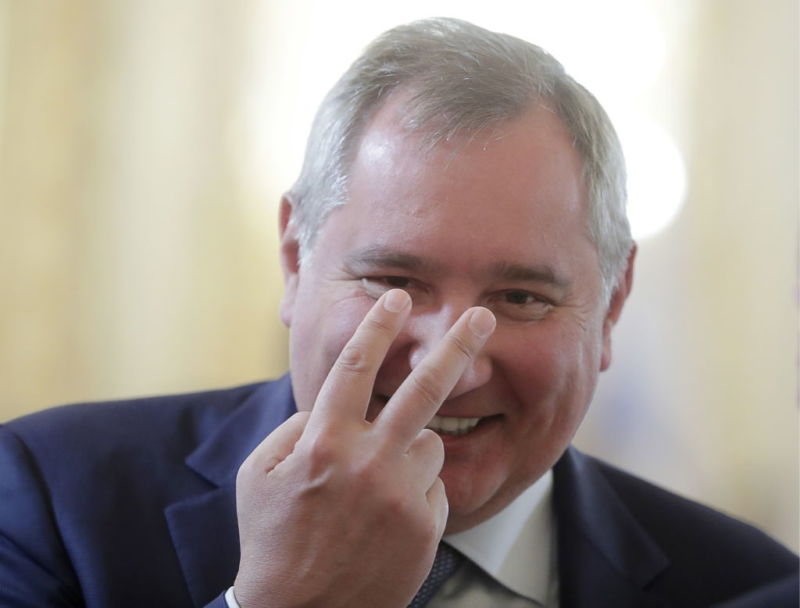
It happened again this weekend. Both Bloomberg and Axios reported that Russia is quitting the International Space Station due to sanctions imposed by the United States on Russia. Each of these stories garnered considerable attention. And each of these stories was also wrong.
This has become a predictable pattern in recent weeks: Dmitry Rogozin, the voluble leader of Russia's space corporation, will give an interview to a Russian space publication, and then Western news outlets will pick up whatever Rogozin says and leap to conclusions that are simply incorrect.
Specifically, this is what Rogozin said on state television this weekend: "The decision has been taken already, we’re not obliged to talk about it publicly. I can say this only—in accordance with our obligations, we’ll inform our partners about the end of our work on the ISS with a year’s notice."
2024 or beyond
This may sound ominous, but that is the wrong interpretation of Rogozin's words. There is actually some positive news in there, with Rogozin saying Russia will give NASA and its other partners a full year's notice before departing. This is more than enough time for NASA and its commercial partners, Northrop Grumman, SpaceX, and Boeing, to work together to salvage the larger Western segment of the space station.
But when will that departure referenced by Rogozin come? The current operating agreement among the 15 partner nations that manage the International Space Station ends in 2024. The United States and most of the other partner nations have indicated they would like to continue flying the space station, which is nearly 25 years old, beyond this to 2030. Russia is still considering its options, although last week NASA Administrator Bill Nelson said he expects Russia to continue participating beyond 2024.
The reality is that, after more than two months of ugly fighting in Ukraine, the NASA-Roscosmos relationship has largely flown above geopolitical tensions. There is no indication that will change in the near term and in his interview, Rogozin is merely restating that the country could choose not to extend its partnership beyond 2024. However, as he often does, Rogozin makes this statement with a bit of bluster, seeking to project power.
What I have learned about covering Dmitry Rogozin for the last decade is that, by far, the best policy to adopt toward him is to ignore what he says publicly. To better understand the 58-year-old Putin-apparatchik's motivations, I spoke on background with a former senior NASA official who has dealt with Rogozin for years.
Understanding Dmitry
“He never wanted this job," the former NASA source said of Rogozin. "He was essentially demoted, and he has spent his time at Roscosmos trying to get back into Putin’s good graces. And so it has just been an extraordinarily different kind of leadership than we’ve seen before, to the detriment of everyone."
For reasons not entirely clear, Putin removed Rogozin from the prestigious position of deputy prime minister for Russia's defense and space industry in May 2018. Rogozin was subsequently tasked with overseeing Roscosmos, which focuses mostly on civil spaceflight. Instead of bringing a space background or industrial expertise to Roscosmos, Rogozin brought his own brand of Russian nationalist politics.
"Going back to the Cold War, there was an unwritten rule where Roscosmos and NASA would not criticize one another," the Western source said. "No matter how bad things got on Earth, the two space agencies would never share an ill word. Rather, they would continue to work together and let the politicians do the fighting. Well, that changed dramatically with Rogozin."
In his time at Roscosmos, Rogozin has taken frequent potshots at the West, and at NASA and its contractors, such as SpaceX (not to mention accusing journalists of war crimes). However, the fundamental relationship between Roscosmos and NASA has not changed. On the level of astronauts and cosmonauts, engineers, and managers, cordial relations continue.
And that's understandable. "In terms of overall cooperation on the ISS, the rank and file at Roscosmos, even the leadership of Roscosmos, desperately wants and needs this activity to continue," the source said. "Because if they drop out of the ISS they lose their space program. We are literally talking about the death of the Russian civil space program."
Rogozin, of course, remains the wild card. He probably would not hesitate to jettison the space station partnership if it scored him points with Putin. But that is not what has happened since the outbreak of the war in Ukraine. Rogozin has blustered and postured, but he has made no definitive breaks with NASA or Russia's Western partners on space station activities. In this case, actions speak much louder than words.
reader comments
357